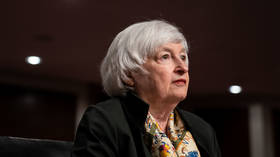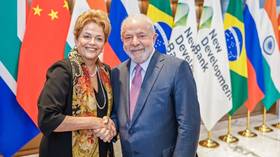Sanctions may backfire on dollar, US Treasury secretary admits

The role of the US dollar as the world reserve currency could diminish due to Washington using its leverage over the global financial system to pursue its geopolitical goals through sanctions, Secretary of the Treasury Janet Yellen has admitted. However, there is no obvious candidate to is replace it, she insisted.
Yellen was asked during an interview on Sunday by CNN’s Fareed Zakaria about the efficiency of the anti-Russia sanctions and about Washington’s track record of what he described as the “weaponization of the dollar.”
Zakaria cited recent statements by Brazil’s President Lula da Silva and other politicians about the risk of dependency on the US currency. He asked whether the present time would be remembered as the moment when “the dollar’s hegemony and its status as a reserve currency began to falter.”
Yellen acknowledged that use of financial sanctions “could undermine the hegemony of the dollar” in the long run, but promised that Washington was using this “important tool” judiciously and with the backing of its allies.
Regardless, she added, the role of the American greenback is explained by factors such as the volume of the US treasuries market, its wide use in international trade, and a “rule of law” in the US that other nations cannot offer.
“We haven’t seen any other country that has this basic infrastructure and institutional infrastructure that would enable its currency to serve the world like this,” she explained.
Opponents of US domination in global finances are not necessarily advocating replacing the dollar with another currency serving the same role. Russia’s leadership has prioritized a transition away from the dollar and into regional currencies.
An absence of a single global reserve currency would be a natural element of multipolarity, supporters of such a model say. The West’s use of unprecedented sanctions against Russia, including bans on trade, seizure of national reserves and denial of financial services to Russian companies, has merely sped up the transition, in their view.
“It’s not a coincidence that the talk about a switch to national currencies have been spurred now,” Russian Foreign Minister Sergey Lavrov remarked in February during a discussion on Russia-Brazil trade. “Nobody knows who the US president could find unappealing after getting up on the wrong side of the bed.”
Yellen also mentioned the issue of frozen Russian assets in her interview with CNN, arguing that “Russia should pay for the damage that it has done to Ukraine.”












